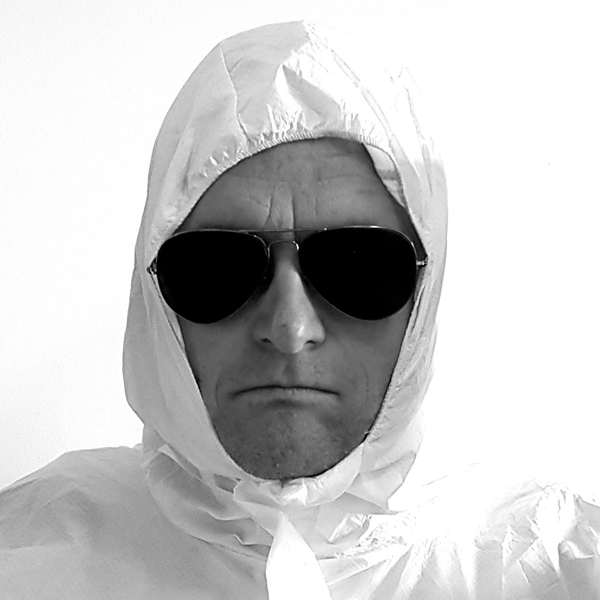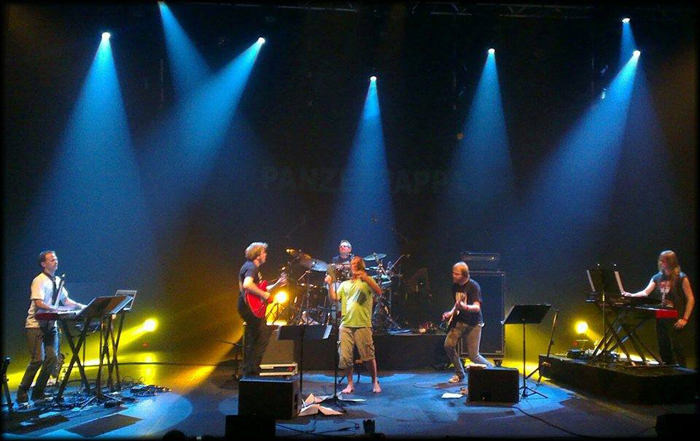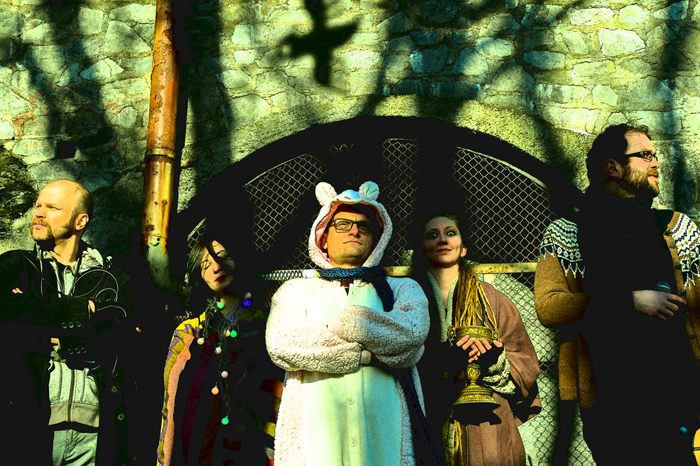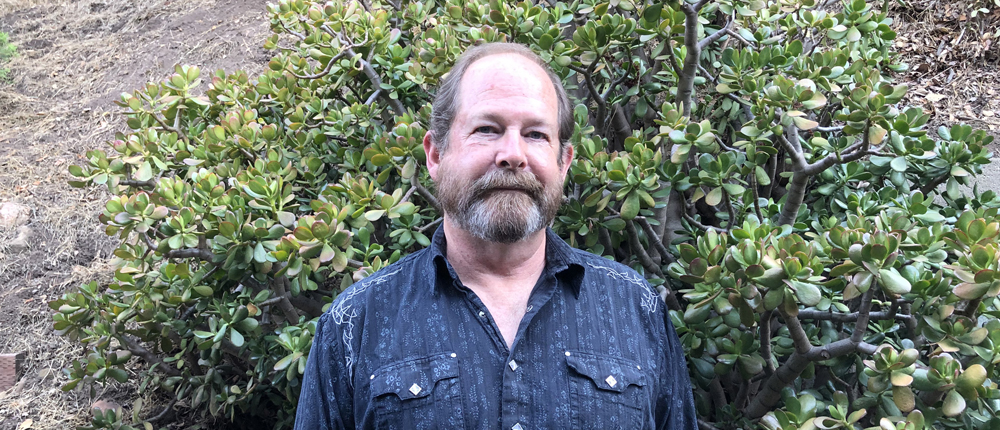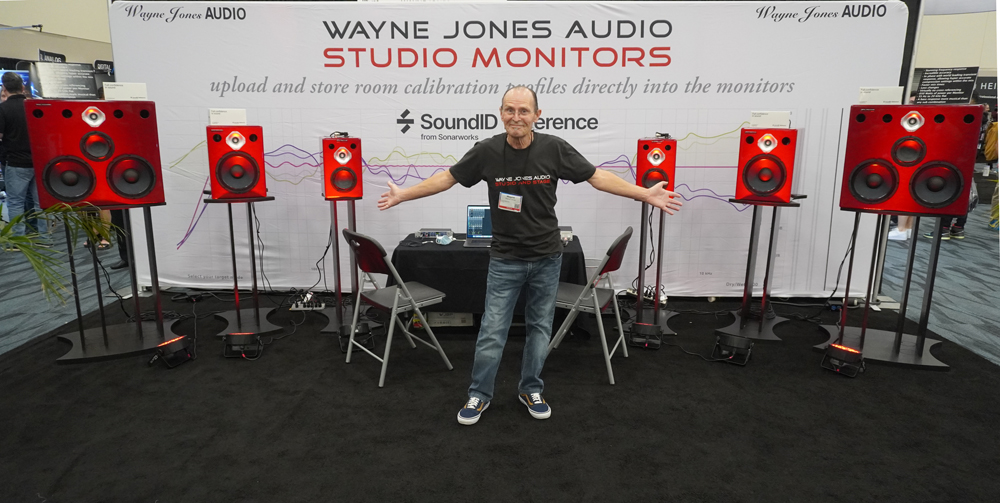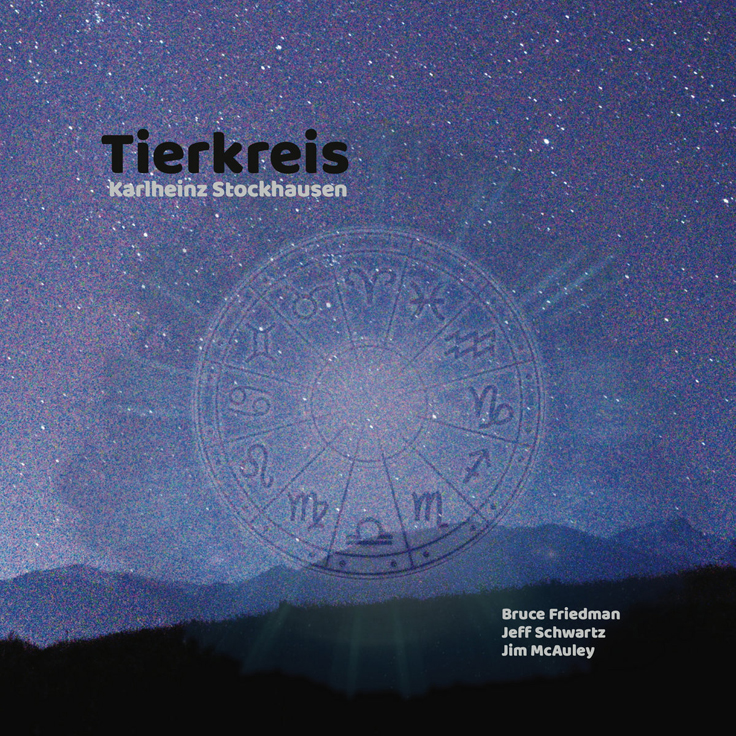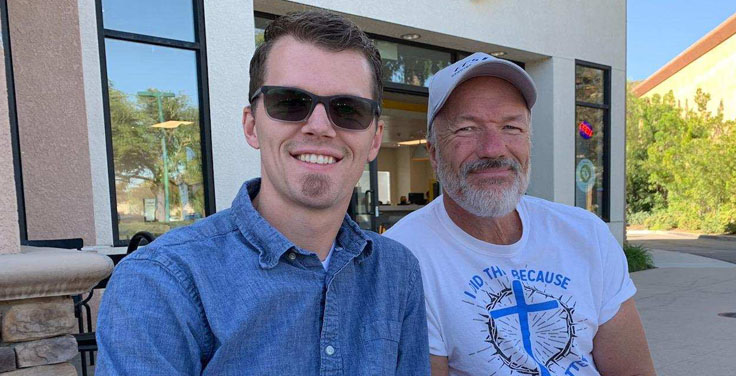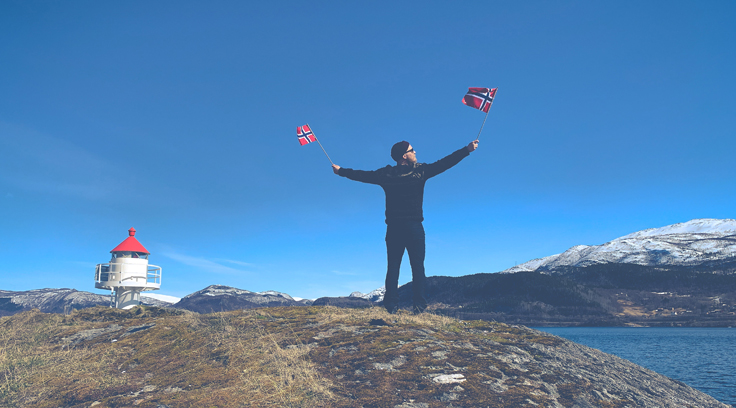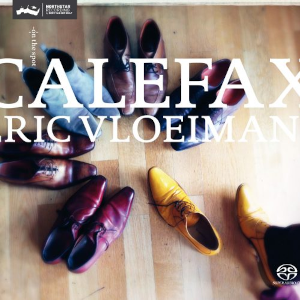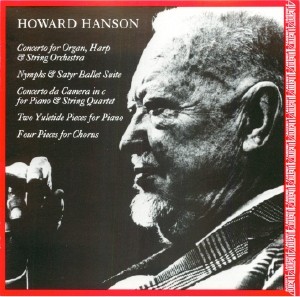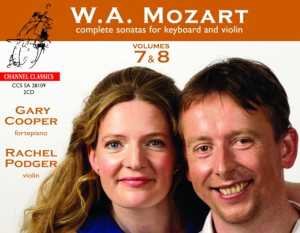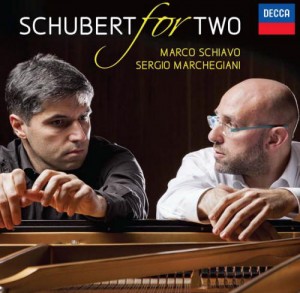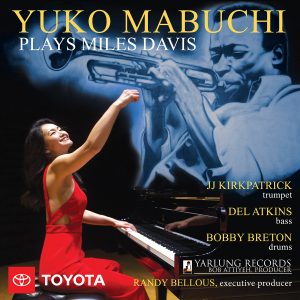Electrond, photo by Trond Gjellum. Used with permission
Trond Gjellum is a Norwegian multi-instrumentalist best known for his work as the leader and drummer for Panzerpappa, an instrumental progressive rock band, and Suburban Savages, which is more song-based. He's worked on a number of other projects, including The Samuel Jackson Five, and +Ingelrii+.
Earlier this month he released a new album, EP!, under the name Electrond. To my knowledge, he's created the first examples of electronic progressive rock.
What was the impetus for Electrond? What was the spark of inspiration?
As much as I love progressive rock, I have also always loved electronic music, especially the music of bands like Kraftwerk, Devo, Front 242, John Carpenter, and so on. I wanted to create a mix of that and my love for progressive rock, and make some sort of electro-prog. I felt that I needed a completely different sound than I could find in Panzerpappa and Suburban Savages, so therefore I created Electrond, where everything is electronic and programmed.
What was your writing process like?
It differs from track to track, but I use a combination of the tools available in the Ableton Live DAW [Digital Audio Workstation] and hardware sequencers like Arturia Beatstep Pro. Usually I have some sort of idea for a bass riff, a melody line and so on, and then I program it into Live or the Beatstep Pro and start to tweak it and make variations. Inside Live I have a lot of possibilities to generate randomness and, when used carefully, you can get some pretty exciting results! Usually things take completely different paths than first intended!
Were you using primarily software synthesizers?
I start out with soft synths, but I also re-record a lot of the lines using hardware synths. The ones that I use the most, is Make Noise 0-coast, Behringer Model D, Arturia Microfreak, Waldorf Streichfett string synth, and Arp Axxe. I also have some other boxes and pieces of hardware, but those are my main tools. All the drums are Ableton's Drum Racks.
Perhaps you can break down one song, in particular: "Seven and Five, The Eternal Friends."
That one started out as a poly-rhythmic experiment that I programmed on the Beatstep Pro. I wanted to merge 7-time and 5-time, but in a musical way so that it didn't sound like a mathematical exercise. First I created the drum and bass rhythms in 5-time, and then I tried out a lot of different melodies in 7-time. Then I fooled around and made a lot of variations and started to think about a structure. The final arrangement was made in Ableton Live because it is easy to get an overview. I also wanted to have a floating vocal melody with long notes to make it a contrast to the busy rhythms.
What was your approach to writing lyrics?
I am very inspired by Brian Eno and David Bowie, and make it very stream of consciousness, using words that I like the tonality and rhythm of, more than telling a specific story. But I am also into storytelling, so I try to combine them.
Can you give me an example of a lyric that embodies both of these ideas?
Yes, indeed! "Hover A Foot Above The Ground" is an example. I just liked the words and, out of those word, grew a story about lost love. Or it is, at least, a story about that inside my head.
Can you share a line or two from the song?
Hover a foot above the ground
None of my ears can catch that sound
(Meaning something the sound of the cracks in the relationship)
Why did you choose to cover the Cream song, "We're Going Wrong?"
I have always loved Cream because they had a unique combination of power, passion and a huge dynamic range. And especially Jack Bruce, who wrote groundbreaking songs. "We're Going Wrong" is a song that touches deeply with so few words. And I like the song form, with no clear cut verse and refrains.
What was your approach to interpreting the song?
I wanted to keep the vocal melody, because it is flawless and beautiful. The arrangement started with the bass line, and just grew from there.
The mood of the original is quite melancholy, and even a bit psychedelic. Were you interested in preserving those elements, too?
Yes, indeed! The character who sings the lyrics is literally begging for understanding, but without using grandiose words and terms. It's like the line in Pink Floyd's "Time," "hanging on in quiet desperation is the English way." It hits me like a hammer. I first heard "We're Going Wrong" when I was ten. The opening of the song is kind of dramatic and heavy, but the lyrics are so tender and sad.
You've made it possible to perform these pieces live. What was your approach?
I wanted to make it possible to perform live. I wanted to make it simple and easy to do that, so I use a Cymatic LP16 backing track player with the prerecorded bass, drums, leads and pads. On top of that I sing live, play a drumpad, a Kaossilator and a Arturia Microfreak synth.
Have you done any public performances?
Yes. Ten! Except for one in Athens, Greece, and Drammen, a town outside Oslo, all of them have been in Oslo, my hometown. The reception has been great!
I know that, growing up in Norway, music education is required. What was your instrument of choice, when you started?
I have always been a drummer and vocalist! I love the energy of the drum kit and all the nuances that the human voice can create!
What were your early musical influences?
I loved a Norwegian group called Dizzie Tunes. They played a mix of children's music, show tunes, jazzy ballads - and all in between. They had a really good drummer that was also a funny comedian. So, of course, I must be a drummer. Later my seven year older brother introduced me to bands like Queen, The Police, and Saga. From there it snowballed into all kinds of music.
Why is it that progressive rock seems to be widely embraced in Norway?
It is a relatively new phenomena that prog has become almost trendy, but Norwegians have always embraced jazz like Terje Rypdal and Jan Garbarek, and the more adventurous [music] has always been big. NRK, the national broadcaster, has also played a lot of different non-commercial music, especially on radio, so I think the average Norwegian is pretty accustomed to "strange" music.
What was your first band?
That was a kind of punk / new wave high energy rock outfit that rehearsed twice and played one concert at a youth club. Of course, it was all noise and un-steady as hell, but I loved the energy!
What was your first professional band?
That was a art-rock outfit that I played in for a couple of years. Very inspired by B52s and Talking Heads. We didn't release anything. Before I started Panzerpappa in 1998, I played in a very good rock band that had a lot of prog elements. We called ourselves Sangioveze, and released an EP.
Panzerpappa at the 2013 Rock In Opposition Festival. Photo by Nina Kaldhol. Used with Permission
What was your idea for Panzerpappa?
I wanted to create a prog rock band that wasn't symphonic, and more into a Rock In Opposition-like sound.
[Note: Rock In Opposition was a movement that began in the late '70s by the avant garde band Henry Cow, to support groups that were creating music not embraced by mainstream record labels. Bands included Story Six, Samla Mammas Manna, Univers Zero, Etron Fou Leloublan, Art Zoid, Art Bears, and Aksak Maboul. It ultimately led to the creation of Recommended Records, a record label run by drummer Chris Cutler.]
Was it hard to find like minded musicians?
No. In fact, it was quite easy. I had been playing for quite a few years, so I knew a lot of different musicians that liked prog.
What was your process for developing material for the band?
Me and Steinar [Børve]—the sax / keys player—had a lot of different ideas, so we just tried them out and developed the ones we liked the most.
Was the process collaborative for the other members? Did they contribute to the arrangements of the work you and Steinar created, or bring in their own compositions, too?
Yes, it was basically like that. They also introduced a couple of songs, but most were written by me and Steinar.
Once the material was written and rehearsed, what was it like taking it to the stage?
For a couple of us it was a bit frightening, because they hadn't played live that much but, after a couple of concerts, we became a good live unit.
How did your approach to writing change as you began to know and understand the capabilities of the individual players, and the band as a unit?
We started to write more specifically for the musicians, but we also wanted to push the envelope and always strive to make music that pushed the boundaries we had as musicians. For example, a song called "Landsbysladder" from the debut, and "De 99 trappetrinn" from the second one. They were quite tricky to get under the skin, but grew to become very good songs.
When you went into the studio to record, were you focused on reproducing the live sound of the band, or using the resources to expand the arrangements?
Kind of both. Using the possibilities of the studio do to overdubs and make bigger arrangements, but also to keep the energy from the live concerts. The first album was much more live. The later albums, and especially the three latest, were very much first constructed for studio and then we made it possible to play live.
Panzerpappa played at the 2013 RIO Festival, which included many of the original bands, and a bunch of newer ones. Were you able to connect, personally, with some of those influential early artists? If so, what was that like?
Yes, that was a really great festival! All of the musicians where great people, and easy to catch up with. Because of this, and a lot of French wine, we decided that Dave Kerman [drummer for 5uus, and Present] should play sandals on one song during our set! Dave is a really great guy, but we had a lot of fun with most of them.
One thing I really love about your work is that it is serious, musically, but it is also joyous and fun. This seems to be true of Panzerpappa, and Electrond. I suspect that's a reflection of who you are, as a person. True?
Yes, in many ways its a reflection of who I am. I am mostly a positive person that is interested in finding solutions. I try to make the best out of things.
Suburban Savages. Photo by Thomas Kaldhol. Used with permission.
We've not really talked about your other project, Suburban Savages. What was the idea behind that band?
It started out as a solo project, but grew into a band, to play progressive music that was more vocal driven and more "pop" sounding. We're in fact soon finished recording a new album.
Are Suburban Savages and Panzerpappa existing concurrently?
Yes, but Panzerpappa is always the main priority for me.
How have you been coping with the pandemic crisis, so far?
It is so unreal, but I have tried to do something musical every day. Sometimes I play the drum pad, toy around with ideas in the computer. But the release of "EP!" coincided with the corona pandemic, so I have used quite a lot of time on that.
Electrond is going to record an internet concert that will be broadcast next week via Facebook Live. Check Bandcamp for Trond's Electrond project, Panzerpappa, and Suburban Savages. Some of the albums are available on CD and vinyl.




